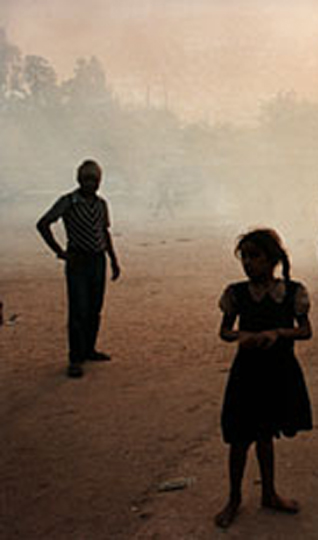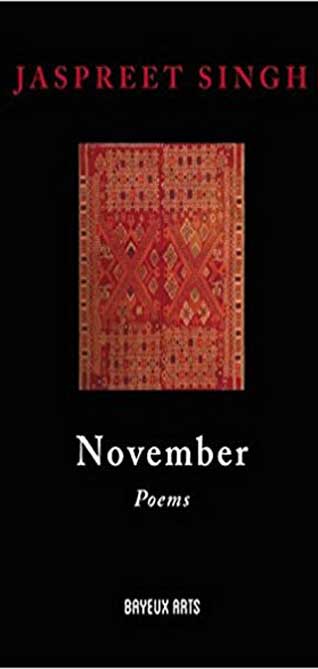Poetry
“Let This Entire Nation Tell Its Children”:
November, A Collection Of Poems by Jaspreet Singh
A Book Review by MARKETA HOLTEBRINCK
NOVEMBER: POEMS, by Jaspreet Singh. Bayeux Arts, Canada, 2017. English, paperback: 124 pages. ISBN-10: 1988440122; ISBN-13: 978-1988440125. Cdn $12.56.
November, a collection of poems by Jaspreet Singh, just published by Bayeux Arts, Canada, reached me on the eve of autumn.
In Toronto, the outside temperature hiked to the unsupportable 31.7C and feeling like 41C, for several days – almost a score shy of the summer ’looh’ temperatures on the subcontinent, I’m told.
Then broke into rain. Autumn, German election results, mixed relief. (As I am wrapping up my rumination on Jaspreet’s love-note to poetry, another election result is coming in – so indescribably Canadian. Jagmeet Singh!)
The sleek black paperback, dedicated to the poet’s late mother, is a collection of seventy-six poems, and a short preamble which cuts straight into the flesh by its first sentence:
“November (1984) was the month of mass murder of Sikhs across India”.
Jaspreet’s not so tiny volume is unmistakably mourning. It is always November, even if “it is cruel April / not the warm November of your wedding day” and in the "Beginning of April", “No one has ever died in our family”.
But the loss, the burning, the waiting, the rage, the insomniac speed, the ambiguity, the apology, the search for names – is carried in a hand luggage of a traveler in the interminable line of words and those who (might) speak them and listen to them.
More than anything, the poet’s meandering between memories of things, images and landscapes on both sides of the Ocean and Time is an invocation of kindred poetic souls, of words that withstand fire and interlocutors who hunger for poems to be passed through.
Jaspreet’s alliance is clearly stated in the opening poem, “Amrit Vela ... after Celan”.
Celan is mostly known to the well-read village for his celebrated and most often anthologized Auschwitz poem “Death Fugue”, with its central oxymoron image of ‘black milk of dawn’ and the lacerating, punctured musicality. (The poem had been included in subsequent editions of German school books at a time when, thirty years after the war, uninhibited artistic explorations of the ‘unspeakable’ were still rare.)
The central image of “Amrit Vela”, which in Punjabi refers to the quiet time of simran (meditation) and recitation of gurbani before sunrise, is the figure of the poet’s Mother. Ma, as he calls her on later pages, is a commanding presence. She never rests on her early morning walks, and her plain appearance outshines 'mangy dogs' as much as 'collective barking'.
The concise, three-line stanzas are infused with a short-lipped musicality, unmistakably resembling with their rhythm Celan’s opening lines. But Celan’s poem has a closure to its disconcerting imagery while Amrit Vela rises to become a stand-in for the everyday gift of language.
It is this quality, really, that sets the collection into movement to become what November aspires to be – an exploration of the acts of (un)speaking and listening, an incessant compiling of voices and ruins as our daily chore of love, and remembering by willfully choosing to not forget.
Timidly at first, the poems learn to touch. Does it need to be austere – or, mustn’t?
You found the way, Ma
— not heavy, tell it light —
But, I am unable to go
there alone
Help me walk
and not walk
It is a balance act called here for, ultimately, one that needs to be repeated every day anew – and the repetition doesn’t make it any less frightening.
“Why then”, another poem asks of us, “before each year comes to an end / I, like so many others, / get Novemberized?”
As I read through the collection, picking up references and history bits, Googling the Bhopal disaster and Warren Anderson, there seem to be no answers to this. Then, mockingly, “Hush... / This must be dark kalyug”.
Or, there are as many answers as there are question marks, or none – only poems.
Long poems that sound like lamentations, traditional poetic forms like the pantoum filled with New World and recent histories, epigrams that condense the transcendental essence of poetry’s body into just a few lines and make it iridescent with the most vivid, all (not)consuming flames: “only one thing burns / in this world / leaving / no ashes — / p o e t r y ”.
In the second half of November, the focus of the volume moves more and more to Canadian shores, as if the tightrope walker had mastered the deadly desire to look back and is free to look ahead to “undamage” things.
In the most upbeat reversal of causality, Jaspreet’s words join hands with Native Canadians and watch the future to come – that is, the one from many that would come.
In one of the most mesmerizing poems in the whole collection, “The Bison have Returned to Banff”, the last line threatens simply by stating a withdrawal: “Not all the bison will return”. Watch out, ‘conquistadores’, you better change your ways!
On the back of the book jacket, P.K. Page is quoted saying, “Jaspreet Singh has the soul of a poet, and the pen of a novelist”. Though, if she could read Jaspreet’s poetic debut, the famed Canadian poet who passed away in 2010 may update her earlier assessment.
Jaspreet Singh’s poetic voice is memorable, not the least because it does not feel the necessity to come up with a fixed identity (as in his last novel Helium). It reads well, indeed, better every time I pick it up to remind myself of a playful line, a shining image of the Golden Temple or a tender Punjabi word.
It professes a Poem to be capable of breaking rocks and of moving mountains by ‘sheer faith’ – all the while burning in ever renewing flames.
Like a Burning Bush, almost.
“November: Selected Poems” can be purchased by CLICKING here.
October 1, 2017
Conversation about this article
1: Harinder Singh (Pune, India), October 02, 2017, 10:51 PM.
1984 was a games of thrones being played by a group of corrupt and evil power-grabbers.
2: Ranmeet Kaur (Oxford, England), October 02, 2017, 11:23 PM.
I have read an earlier review by you and enjoyed this one even more. Makes me want to grab the book and read the poems instantly. Which I will do forthwith ...




